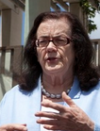A fresh start to an important political year
 The Age’s former political editor Michelle Grattan today joined the universities-funded website The Conversation. She argues that the media needs multiple voices.
The Age’s former political editor Michelle Grattan today joined the universities-funded website The Conversation. She argues that the media needs multiple voices.
May I start my introductory column for The Conversation with one not-so-bold prediction. This hung federal parliament – just the second in a century – is likely to be the last one we’ll see for a very long time.
With some notable exceptions, the Australian people usually speak fairly clearly at federal elections. Even when they don’t, the electoral system tends to produce a decisive result. It’s unlikely to be different on September 14.
What will be distinctive about this election is that the date is known so many months out. Of course, in a parliament where the unexpected is the expected, that could change – for instance, if Kevin Rudd were to achieve the Herculean challenge of seizing the leadership.

